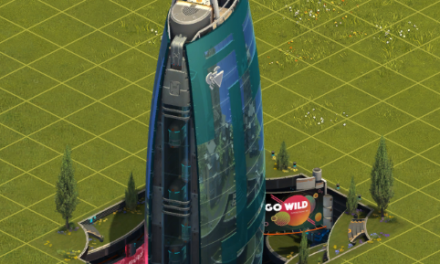The addition of the GB Arc into the game changed the way all GBs would be leveled forever; and likely is also the beginning of truly power leveling GBs. It changed the economy surrounding FPs, and it truly separated the serious players from the casual players (and there’s nothing wrong with playing casually). In this article I will discuss the differences between a General Swap and a Lock Thread, how a Lock Thread works, and why the Lock Thread is the better leveling option for all players (but especially the serious player).
Now, if you’re playing casually and don’t particularly care what happens with your GBs, how long it takes to level them, the cost to level them, etc.; then you’re not going to need anything more than a general swap for your GBs. This is 100% a-okay. You do you. This is an extremely diverse game, play it however it’s fun for you. On the flip side if fun for you is pushing things to the limits, moving pretty quickly, and really optimizing your city; then you’re going to need more than the general swaps.
You might be asking though, what is a general swap? A general swap is an exchange of FPs that is continuous. Most guilds have them, and the thread will be labeled with how much is being swapped in one go. So for example a thread titled “50 FP Swap” or “50 FP Continuous” or “50 FP”, etc (you get the idea) means that the thread requires 50 FPs. You would open it up, attach your GB, and then add 50 FPs (in this example) to the GB directly above yours in the thread. The next person coming in would then add their GB below yours, and add 50 FPs to your GB. With a swap like this only one thing is guaranteed: you get FPs on your GB. That’s it. You’re not promised a spot on anyone else’s GB, you may or may not see returns from it, you’re just getting some FPs on your own.
In a small guild (about a dozen players, max), these swaps are far more likely to come with the promise of a reward. Typically though you’re going to be in a guild of 30+ people, and that means the chances are slim.
You could do a direct swap, which is better than a general swap, but that’s still not the best leveling option out there unless you’re hunting specific BPs.
No, by far the best leveling option now, because of the addition of Arc, are lock threads.
Lock threads are a place where you can take your prepped GB to ask Arc holders (or non-Arc holders who are willing) to place a specific amount of FPs on your GB. Every guild runs their thread(s) a little bit differently, so I can’t speak to all lock threads out there. Some common things you will find though are thus:
- 1.9 is restricted to those who have a Level 80+ Arc
- All GBs posted must be free from outside donations/Swap thread donations
- You need to call a spot before taking it
- Marking the thread clear if nothing is left
- Spots you request a lock on must be safe
In general a lock thread will be either for 1.8, 1.85, and/or 1.9 locks. These numbers denote the multiplier by which you look at the reward spots. I know it’s going to make you groan my friend, but there is some math involved here. Bear with me, it’s the basics, you’ve got this–I promise.
When we look at a GB we can see there are (typically, rarely do we differ from this) five chests, one in each of the top five donation spots. Checking these chests will reveal a reward amount for FPs, Medals, and BPs (in that order) should you place in the top five for FP donations to that GB. If you have an Arc then you’ll see two columns, the first column being the base reward that everyone gets and the second column being the additional reward that you, the Arc holder, will receive for your Arc bonus.
- Without Arc
- With Arc
Arc bonus is based on the level of Arc, and you’ll see it listed as a percent. This percentage is then made a multiplier by putting “1.” in front of it. So a 90% Arc Bonus becomes 1.9. An 85% Arc Bonus would be 1.85. So on and so forth.
Lock threads work based off these bonuses, but often allow the Arc holder to profit; that is to receive back more FPs than they invest in the GB. In many guilds this is considered natural since the player put all the effort into raising Arc, and is sending FPs on your GB, so they deserve something back. Very rarely you’ll encounter a guild like my own where we believe that profit is not meant to be made on your guild mates, so we don’t allow it. Both ways of playing are perfectly valid, you just have to go with what feels right for you and choose a guild (or create one) accordingly.
I digress though, back to the threads themselves. Like a General Swap, the Lock Thread title will denote how much the Arc holder is going to invest in your GB for any given spot. They will typically only be labeled as “1.8”, “1.85”, and “1.9” for amounts, and then some other nomenclature (such as “Lock”) after them to specify what the thread does. So this number is what you use for your Lock Math.
I’m not going to review Lock Math here (since I have a dedicated article), just a summary. Lock math is figuring out how much you need to self-donate so when an Arc holder invests in your GB at a specific rate for a specific spot, they cannot be passed by anyone else. If you hit a decimal in your math, you always round up if it’s 0.5 or 0.75, but you round down if it’s 0.25. If you get a negative number that means the spot(s) is already safe to be locked.
They are called locks because the player adding FPs to your GB is locked in–they cannot be passed by anyone else.
So why locks and not general swaps?
Well, a general swap is like the lottery. You’re going to keep throwing FPs at it, hoping to get something back. If you get really lucky you’ll win big and get a lot back, but the chances are extremely unlikely unless the odds are favorable due to a small number of participants. A lock thread on the other hand is like a small business loan. You have to show some of your own investment, but others will thus give you extra FPs as well which they will receive back (with interest in some cases) when you level your GB. And taking locks [when you have a well-leveled Arc] is like opening a savings account because whatever you put in you’re [mostly] getting back.
If we pretend your city is your business (since running a city kind of is a business), then we all can agree it’s smarter to try and get start-up capital through loans than it is by hoping you win the lottery.
Still, this analogy might not be enough so lets actually look at how much you save, in FPs, by using a lock thread versus using a general swap.
For our example we’ll look at Cathedral of Aachen (or Hagia Sophia since they’re a match), going from level 9 to level 10.
Total cost to do this level is 600 FPs. First place has a base FP reward of 65, second place of 35, third place of 10, and 4th place of 5, with 5th offering only medals and BPs.
If you run this through General Swaps you will have to spend a total of 600 FPs to level it, because for every FP someone invests on your GB this way you will also have invested the same amount on someone else’s GB. It is unlikely that you’ll score rewards in every GB you put FPs on with this method, but lets say you get really lucky and earn 10% of that back from rewards; that’s 60 FPs. That’d make your investment 600 FPs, which is 100% of the cost, and your return 60 FPs, which is 10% of the cost. This essentially means a savings of 60 FPs.
Now lets say you run this through a 1.8 thread. There are FP rewards on the first four positions, so all of them are eligible to be locked. For the sake of this example we’ll say you get locks on the first four, and someone chucks 1 FP on to get the BPs from 5th. This means you’ll get 207 FPs (Note 1) from the locks, plus 1 FP from the BP hunter for a total of 208 FPs. This means you’re left with the remainder of 392 FPs on this level. That’d make your investment 392 FPs, which is 65% of the cost, and while your return is 0% it does mean a savings of 208 FPs, which is the other 35% of the cost. Unless you can make 208 FPs in return through using the General Swaps, it’s a cost savings.
Furthering our example, lets say you had access to a 1.85 thread for this same GB and level. That’d mean you’d receive 214 FPs (Note 2) from the locks, plus 1 FP from the BP hunter for a total of 215 FPs. This means your investment is now 385 FPs, or 64% of the cost. That extra .05% from the locks (since they’ll be locking at an 85% rate instead of an 80% one) gains you a whole percent off, which adds up over time. Again, your return is 0 FPs but you also are unlikely to have earned 215 FPs back from the General Swaps.
Even further in our example is access to a 1.9 thread for this same GB and level. That’d mean you’d receive 220 FPs (Note 3) from the locks, plus 1 FP from the BP hunter for a total of 221 FPs. This means your investment is now 379 FPs, which is 63% of the cost. It also means you saved 221 FPs which again, you are unlikely to have earned back via the General Swaps.
I know it can seem really crazy that self-investing in your own GB is better than investing in others’ GBs, but the reality of it is you end up spending more in General Swaps than self-investing and getting locks because you simply won’t see the FPs returned to you via the General Swaps in an amount that equals or is greater than the amount you save from the Locks.
Here it is in an easy table visual:
| General Swap | 1.8 Lock | 1.85 Lock | 1.9 Lock | |
|---|---|---|---|---|
| Cost | 600 | 600 | 600 | 600 |
| Investment | 600 | 392 | 385 | 379 |
| Return | 60 (approx.) | 0 | 0 | 0 |
| Savings | 60 | 208 | 215 | 221 |
Just for the heck of it, what would it look like if you just locked it at base rewards?
That’d be 115 FPs (Note 4) from locks, plus 1 FP from the BP hunter for a total of 116 FPs. That’d leave you with 484 FPs to invest, or 81% of the cost. It’s not nearly as good as getting those really sweet locks from an Arc holder, but 166 FPs saved is still better than the 40 you might save from using General Swaps.
You also cannot underestimate how much it speeds you up on leveling your GBs when you’re saving hundreds of FPs on the investment. If you’re only making 30 FPs a day (for example) to put in your GBs, needing to use 392 FPs instead of 600 FPs to get a GB leveled is a difference of 6 days worth of FPs (Note 5). That’s almost a whole week faster to level in this example by using locks versus the general swaps. A week!
Similarly with those 30 FPs you earn in a day, if you’re looking to save them up you can keep an eye on locks that only cost 10 to 20 FPs and invest there. Sure, the fifth place spot that offers 5 back and locks for 10 FPs means you lose 5 of what you invested, but you’re guaranteed to get 5 back which become packs you can spend later. You cannot guarantee you’d even get that in a General Swap. This is a topic for a different article though, so rather than make this one any longer than it already is I will not make another digression.
In conclusion, as shown with actual numbers, it’s far wiser to use a lock thread than a general swap thread if you’re serious about this game. Even though it can take a bit to get the math down to make spots safe on your GBs for locks, it’s worth learning. And if you don’t want to learn it, there are a ton of calculators out there to help; but they only work if your GB has no FPs on it and you put all the information in correctly, which is why I recommend learning the math anyway.
1: All base rewards multiplied by 1.8 and added together so: 65*1.8=117, 35*1.8=63, 10*1.8=18, and 5*1.8=9
2. All base rewards multiplied by 1.85 and added together so: 65*1.85=120.25 (120), 35*1.85=64.75 (65), 10*1.85=18.5 (19), and 5*1.85=9.25 (9)
3. All base rewards multiplied by 1.9 and added together so: 65*1.9=123.5 (124), 35*1.9=66.5 (67), 10*1.9=19, and 5*1.9=9.5 (10)
4. All base rewards added together so: 65+35+10+9
5. 600 total FPs divided by 30 FPs a day is 20 days, 392 total FPs divided by 30 FPs a day is 13.06 (repeating) days, or 14 days







Trackbacks/Pingbacks